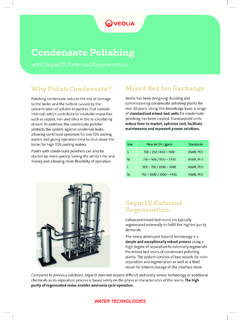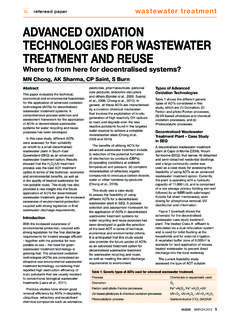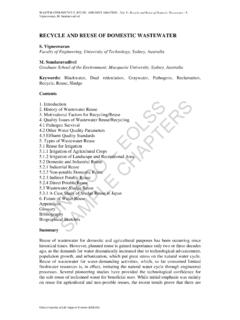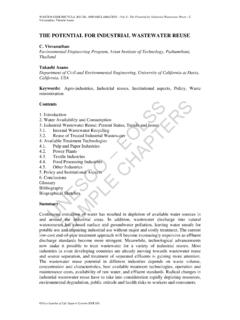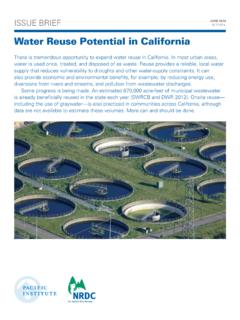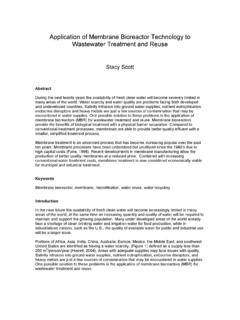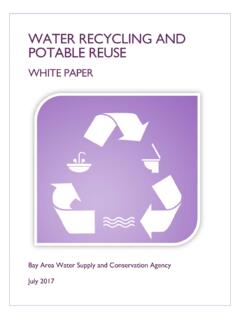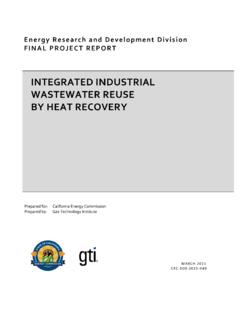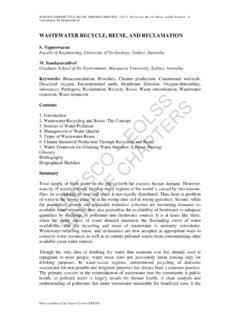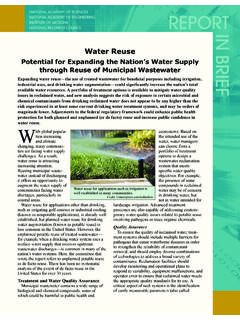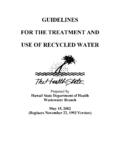Transcription of Wastewater Recycling, Reuse, and Reduction - Veolia Water
1 Issue 10 Page 1 Wastewater recycling , reuse , and Reduction By James McDonald, PE, CWT, Technical Resource Engineer Industry uses Water to create steam, generate electricity, cool and heat processes, clean components, or produce products. While Water can be the life blood of many industrial processes, this same life blood usually becomes a Wastewater that costs money to treat or send to the local publicly owned treatment works (POTW). Typical industrial Wastewater streams include nonsanitary streams, reverse osmosis concentrate, softener regeneration, ultrafiltration waste streams, process wastes, oily wastes, and high metal content Wastewater . As discharge limitations become tighter and tighter, the costs become higher and higher.
2 Also, as the cost of Water itself increases, the idea of recycling , reusing and reducing Wastewater becomes even more attractive. Wastewater recycling is defined as treating a Wastewater stream to the point that it can be recycled back to the process that created it in the first place. Wastewater reuse is treating a Wastewater stream to the point that it can be reused some place else in the plant. Wastewater Reduction involves minimizing the generation of Wastewater in the process itself. See Table 1 for examples of these strategies. Figure 1: Ultrafiltration Pilot Unit There may be many viable uses for Wastewater , but each circumstance will have to be considered separately. The basic steps for determining if and how to recycle, reuse , or reduce a Wastewater stream are: 1.
3 Identify the Wastewater stream. 2. Characterize the Wastewater stream. What are the components that make it a Wastewater stream ( , oils, heavy metals, dissolved solids) 3. Identify potential treatment options, if any, which are necessary such as conventional physical/chemical Wastewater methods, biological treatment, ultrafiltration, degasification, reverse osmosis, and ion exchange. 4. Identify potential uses for the Wastewater . Steps 3 and 4 are interchangeable because the use will dictate the treatment, but the treatment that is possible may also dictate the use. 5. Understand the process requirements for Water quality. 6. Benchtop test the treatment strategy in a laboratory. See Figures 2, 3, and 4.
4 7. Pilot test the treatment strategy live and on-site with scaled-down versions of the treatment technology. See Figures 1 and 5. 8. Install the full-scale treatment system. Issue 10 Page 2 Figure 2: Benchtop Reverse Osmosis Conclusion Wastewater recycling , reuse , and Reduction can have both financial and environmental benefits. Determining if such a strategy will work at your plant requires upfront work to ensure its success and possibly some outside the box thinking. The old saying goes something like One man s junk is another man s treasure. The same can certainly apply to Wastewater . If you have any questions, comments, or ideas concerning Wastewater recycling , reuse , and Reduction , please contact your local CROWN Water Management Specialist.
5 Figure 3: Benchtop Ultrafiltration Figure 4: Pilot Rig for Silt Density Index, Ion Exchange, and UF Testing Figure 5: Reverse Osmosis Pilot Unit Issue 10 Page 3 Table 1: Wastewater recycling , reuse , and Reduction Examples recycling Water Softeners Brine recycling collects the brine solution from the end of the brining cycle and uses it at the beginning of the next brining cycle to reduce the amount of brine and Water used for regeneration. Rinse Waters Removing the offending ingredient in a rinse Water with a filter, ion exchange, ultrafiltration, reverse osmosis, etc. may allow the Water to be recycled.
6 reuse Cooling Towers Waste streams such as reverse osmosis concentrate may be of high enough quality to use as cooling tower makeup. With treatment such as degasification, filtration, etc., other waste streams may be usable too. Rinse Waters Rinse waters may be cascaded from one rinse bath to another for reuse . Paper Mills Boiler blowdown, softener regeneration, etc. can be used in the pulp process to reduce the amount of Water and maybe even heat required in the process. Reduction Boiler Blowdown Improved pretreatment technologies such as reverse osmosis can be used to decrease boiler blowdown. Condensate Return Increasing condensate return to the boiler system will reduce boiler blowdown, makeup Water pretreatment wastes, fuel costs, and the amount of condensate that goes down the drain.
7 Automatic Boiler Blowdown Control Maintaining boilers at their conductivity setpoints eliminates wide control swings that can increase blowdown unnecessarily. Cooling Tower Using soft Water or improved inhibition chemistries can reduce blowdown. Rinse Waters Rinse waters may be cascaded from one rinse bath to another to reduce Water usage and Wastewater generation. Crown Solutions Co., LLC 945 South Brown School Road Vandalia, OH 45377 (937) 890-4075 Issue 10 Page 4


